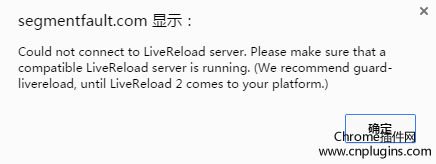
The server did start to contact browsers, but on reload there was an error like The problem was in a way I was calling livereload.change.
#Livereload chrome change port install
LIVERELOAD INSTALL You simply need to download the LiveReload gem and install the extension/plugin in your browser of choice (as long as your browser of choice is Chrome, Safari, or Firefox). The LiveReload server can also be used in conjunction with BrowserSim, extending LiveReload to simulated devices. chopfitzroy commented on I updated gulp-livereload to v3.0.2 (from 2.1.1) and the message of listening to a different port went away. When you have all that set up you can make edits to your files and have the changes display instantly in the browser. Unique features of LiveReload tools include LiveReload for both workspace and deployed resources due to the use of HTTP protocol for all resources and LiveReload on external devices with access and ease of use for remote connections to LiveReload servers. The server can also be configured to inject the livereload.js JavaScript snippet into the source code, which removes the need to install LiveReload browser extensions. LiveReload Tools is the implementation of the LiveReload server-side component, which listens to the IDE for resource changes and sends notifications for refreshes as appropriate. The capabilities of LiveReload Tools also removes the need to install the LiveReload standalone application or browser extensions. It enables you to take advantage of LiveReload browser refreshing while editing files within the IDE. LiveReload browser extensions are freely available for Chrome, Firefox and Safari from. LiveReload Tools is tooling that implements LiveReload in the IDE. The spring-boot-devtools module includes an embedded LiveReload server that can be used to trigger a browser refresh when a resource is changed. LiveReload browser extensions are available for Safari, Chrome and Firefox. The LiveReload application is available for OS X and Microsoft Window operating systems and through a third-party provider for Linux-based operating systems.

#Livereload chrome change port Patch
You'll also monkey patch every served HTML page to be aware of this high port and the services it provides. It'll live in a high port, and it's only responsibility is to watch files on the harddisk and notify if any changes. Depending upon the changes to the source, the web page is either reloaded or the browser updated instantly without reloading. To make changes refresh in the browser, in addition, you'll start another server. LiveReload 2 server listens on port 35729 and serves livereload.js over. Alternatively, it can be inserted manually in the HTML pages. It gets change notifications from a LiveReload server and applies them to the. The JavaScript snippet can be installed and activated using a LiveReload browser extension. The server-side and client-side components communicate using the WebSocket protocol, which allows the server-side application to send notifications to the client-side JavaScript snippet. Based on project statistics from the GitHub repository for the npm package livereload, we found that it has been starred 325 times, and that 535 other projects in the ecosystem are dependent on it. As such, we scored livereload popularity level to be Popular. On the client-side, a JavaScript snippet receives the notifications and invokes the browser to refresh the web page. The npm package livereload receives a total of 100,323 downloads a week. The server-side application monitors the source and sends notifications as the source is changed. This information can be set via URL parameters. After that, just type grunt to start a web server at port 8080 to host your blog with live reload enabled. Running Type npm install to download the required Grunt dependencies for the first time. FWIW, node-and-npm-in-30-seconds.sh might be useful if you are not familiar with npm. LiveReload consists of server-side and client-side components. Install LiveReload plugin for Chrome browser. Immediate and automatic web page refreshing, without the need to manually refresh, simplifies the workflow of web developers. Gulp.LiveReload is an open source tool that refreshes web pages open in browsers as their source is edited. StripDebug = require('gulp-strip-debug'), MinifyHTML = require('gulp-minify-html'),

Var autoprefix = require('gulp-autoprefixer'), If I change my files, the console says that the file was reloaded. So I am trying to set up the livereload server, however, I never get the message Live reload server listening on: like in this video.


 0 kommentar(er)
0 kommentar(er)
